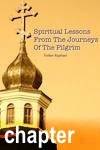 Do not despair even in the worst of times, or the most painful suffering, for our God’s mercy will prevail.
Do not despair even in the worst of times, or the most painful suffering, for our God’s mercy will prevail.
Dear beloved,
Remember our pilgrim? His legs were paralyzed and he collapsed in front of the church, ignored by many. A peasant came to him and said he could heal him, in exchange for something. The pilgrim lamented that he did not have anything valuable to give the peasant. The peasant then asked if the pilgrim would work for him for a season. The pilgrim said that he could not work due to a complete disability of one arm, but could read and write. The peasant gladly asked the pilgrim to teach his son to write, as tutors were expensive.
The peasant collected many rotting bones of animals and made tar out of the bones, and applied the liquid on the pilgrim’s legs. In just five days, the pilgrim could walk around with a cane, and was healed completely in just one week! The pilgrim thanked God for His wondrous creation, that even a pile of rotting bones could bring life back to damaged limbs, surely an affirmation of the resurrection and life ever after (St Luke 18:27).
When the pilgrim recovered, he started teaching the peasant’s boy, by using the Jesus Prayer. Eventually, a local estate steward saw the boy and was impressed enough to ask who his tutor was. The steward found the pilgrim and saw him reading the Philokalia. However, the steward was not impressed by the Philokalia and thought that the “endless repetition” of the Jesus Prayer was insane and not productive to the spiritual life.
The pilgrim corrected the heterodox mind of the steward, and mentioned that the Philokalia was written by some of the greatest Orthodox minds, including Saint Anthony the Great (Coptic), Saint Macarius the Great, Saint Mark the Anchorite, Saint John Chrysostom, and many others. The Philokalia contained the purest form of inner prayer, which inspired many other traditions that eventually corrupted the original teachings. Therefore, in all manner of inner prayer, there is nothing like the Philokalia, which preserved the truest inner prayer to God (St Mark 13:33). The pilgrim enlightened the steward that it was productive for a Christian to grow and mature in the faith, and not just adhere to the bare minimum of daily prayers or the occasional attendance at a Divine Liturgy. All too often, the pilgrim commented, that people grow lazy in the inner heart, and instead, focus just on superficial external works, and fall into pride, delusion, or isolation. The steward was impressed with the teachings of the Philokalia, and eventually, he invited the pilgrim over to his house and read the Philokalia to his wife and him.
One night, while the pilgrim was at the steward’s house, the steward’s wife choked on a fish bone. The reposed starets appeared to the pilgrim in his dream once again, and provided the unlikely cure of using lamp oil to extricate the fish bone from the steward’s wife. When the pilgrim woke up, he immediately told the steward to use lamp oil, which caused the old lady to cough, and the fish bone came out. The steward could not believe the merciful miracle revealed to the pilgrim through a dream, and word soon got out to the community of the pilgrim’s gifts (Jeremiah 30:17).
The pilgrim was afraid of falling into vainglory, and one night, slipped out of the community without informing anyone.
In our journey throughout life, there will be people who appreciate some of our humble gifts and talents. For example, we may be a good craftsman, healer, engineer, tailor, and so on. People may come to us frequently for advice or help, growing reliant on us, and sometimes, heaping flattering words onto us. Not everyone is a saint, and so sometimes, we lapse into prideful sin when we begin to indulge in these flattering words and may even begin to believe them to be true. That’s a clear space for the evil one to tempt us further, to draw us away from our journey to God, and to keep us foolishly contented in an endless loop of suffering disguised as “joy”. Therefore, the pilgrim was under the mercy of God, to discern such spiritual dangers, and left without any attachment (Galatians 5:26).
The pilgrim walked and walked, rejoicing at the great inner joy he got from inner prayer. There were stretches of paths he took where he felt as if he was the only person on earth. To many of us living deep in the world, this feeling is alien to us. We face many people every day, taking the bus, the transit train, getting a quick bite at the nearby food market, rushing to office buildings, or even on supposed weekends at the busy malls – there are people everywhere. And yet, if you sit still for just a minute, in a corner of a mall, or a corner of the food market, and pray the Jesus Prayer, you might just discover where that sacred quiet space is, deep in your heart. It takes some practice to shut out the rush of people around us, the audio and visual stimuli of the noisy conversations around us, but with practice, you will find that inner peace of praying the Jesus Prayer. It is not because we are skilled or talented, but as Saint Macarius the Great said, God’s Divine mercy will come to us if we persist in prayer, and grant us that inner joy of prayer eventually.
Our Lord gave the pilgrim yet another spiritual consolation soon after. When he was venerating the relics of Saint Innocent at Irkutsk, a merchant met him and invited him over. The merchant suggested to the pilgrim that he should visit the holy city of Jerusalem, for there are churches and relics of saints aplenty. The pilgrim sadly said that he did not have money to go there. But the merchant told the pilgrim he would write a letter to his son in Odessa, and his son would then arrange for the pilgrim to visit Jerusalem. The pilgrim was overjoyed, and fell at the feet of the kind merchant (Colossians 3:12).
Let us pray unto our Lord, with grateful joy of His many consolations:
“Lord Jesus Christ, Son of God, have mercy on me, a sinner.”
